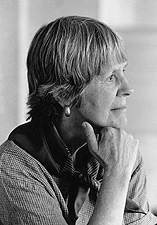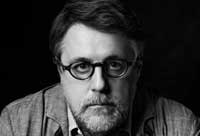
Ignacio Aguero - An award-winning filmmaker, writer, and producer. He remained in Chile during the entire period of the dictatorship making independent documentary films.

Chantal Akerman - Comparable in force and originality to Godard or Fassbinder, Chantal Akerman is arguably the most important European director of her generation. -- J. Hoberman, The Village Voice

John Akomfrah - An artist, lecturer, and writer as well as a filmmaker, his twenty-year body of work is among the most distinctive in the contemporary British art world.

Marc Allégret - A French director and photographer with a eye for discovering new talent. He helped start the careers of future stars including Brigitte Bardot, Simone Simon and Jeanne Moreau.

Natalia Almada - Recipient of the 2012 MacArthur “Genius” Award, Natalia Almada combines artistic expression with social inquiry to make films that are both personal reflections and critical social commentaries.

Madeline Anderson - The first African-American woman to direct documentaries, Madeline Anderson created films that are essential historical records of activism and a vital body of cinematic work.

Alice Arnold - A non-fiction filmmaker and an educator, her films and photography work explore the urban environment and visual culture.

Nurith Aviv - Having worked on about 100 films, both fiction and documentaries, Film Journal International has hailed her as "Innovative and daring.

Wang Bing - Born in Shaanxi, Wang Bing has been a leading documentary filmmaker of the burgeoning independent documentary scene in China over the last decade.

Natalie Bookchin - Natalie Bookchin explores the effects of digital technologies and examines the ways in which people broadcast self-expression on the internet in a sharing economy.

Mosco Boucault - Born in Bulgaria in 1946, Boucault grew up as an immigrant Jew in post-war Paris. His gripping verité documentaries investigate policing and the French resistance.

Noel Burch - Photographer, theorist and filmmaker whose work frequently focuses on large economic systems, or "the imaginary and material geographies of the advanced capitalist world."

Olivia L. Carrescia - Olivia L. Carrescia has worked as a researcher, producer and editor for the past 25 years in the US and Europe. She is known for her award-winning Mayan trilogy (Todos Santos Cuchumatan and The Survivors, and Mayan Voices: American Lives).

Raymond Depardon - Raymond Depardon is a celebrated photographer, photojournalist, and documentary filmmaker. A prolific artist, he has so far directed 20 feature-length films and published over 50 books.

Jihan el-Tahri - An Egyptian-born, French filmmaker, author and news correspondent, el-Tahri's films include the Emmy-nominated House of Saud, The Price of Aid, and Behind the Rainbow.

Elizabeth Fernea - A writer and filmmaker whose work focused on the Middle East, particularly women and the family. She was Professor of English and Middle Eastern Studies at the University of Texas at Austin, where she taught for 25 years and was one of the founders of the Women's Studies program.

Fischli and Weiss - The Swiss artists Peter Fischli (born 1952) and David Weiss (born 1946), hailed by The New York Times as "the merry pranksters of contemporary art" and by ARTNews as "the best thing in Swiss art since Alberto Giacometti," have worked as a creative duo since 1979.

Nikolaus Geyrhalter - Nikolaus Geyrhalter is an Austrian director, producer, writer, and cinematographer who is best known for his static, observational style.

Jessica Gorter - Jessica Gorter has been working as an independent filmmaker focusing on post-Soviet Russia since graduating from the Dutch Film and Television Academy in Amsterdam.

Maren Grainger-Monsen - A physician and award-winning filmmaker, who is currently Filmmaker in Residence and Director of the Program in Bioethics and Film at the Stanford University Center for Biomedical Ethics.

Patricio Guzmán - The acclaimed Chilean documentarian, most notably of the masterpiece The Battle of Chile.

Dieudo Hamadi - The Congolese director of critically-acclaimed, social issue documentaries, including Downstream to Kinshasa.

Esther Hoffenberg - Hoffenberg has been working as director and producer in France since 1980. Since 2005, she has become increasingly involved in filmmaking.

Heddy Honigmann - Called "one of the contemporary masters of the form," Honigmann’s (1951-2022) work is known for strong imagery and her compassionate connection to her subjects.

Shôhei Imamura - The only Japanese director to twice win the Palme d'Or at the Cannes Film Festival. Shôhei Imamura has been described by The New York Times as "one of the most significant Japanese filmmakers of the postwar generation."

HU Jie - In an oeuvre that includes woodcuts, animation and oil painting alongside documentary film, Hu Jie is credited as the first Chinese artist to frankly depict and document the horrors and heros of the Cultural Revolution and the Great Leap Forward.

Alain Kassanda - Born in Kinshasa and living in Paris, filmmaker Alain Kassanda's award-winning documentaries illustrate the impacts of colonialism.

Robert Kramer - A preeminent filmmaker of the American left, Robert Kramer was a significant presence in the independent film movement of the 1960s, celebrated for his distinctive cinematic style which blended fiction and docuentary filmmaking.

Arthur MacCaig - An American of Irish descent and founder of DATHANNA, an independent production company, MacCaig directed and produced documentary films since 1978, including the award-winning A Song for Ireland and The Patriot Game.

Vitaly Mansky - Born in Ukraine in 1963, Mansky has directed more than 30 films that have been screened at nearly every major festival worldwide.

Chris Marker - The almost legendary genius; a cinematic essayist and audio-visual poet who created A Grin Without a Catand Remembrance of Things to Come. A pioneer auteur filmmaker and an original voice in world cinema for over 50 years, Marker passed away on his birthday, July 29, 2012.

Rosine Mbakam - Rosine Mbakam, a prolific, award-winning, Cameroonian-born filmmaker, is changing how African women are represented on screen. Her newest film Mambar Pierrette at the Cannes Film Festival.

Djo Tunda Wa Munga - Founder of the Democratic Republic of Congo's first production company, Suka Productions!, director/producer Djo Tunda Wa Munga's films include State of Mind, Viva Riva!, and Congo in Four Acts.

Shinsuke Ogawa - Born in 1935 in Sagamihara, Kanagawa, Japan. He began his film career in 1960 by making public-relations films, but soon left this lucrative career to devote himself to the production of independent documentaries.

Marcel Ophuls - Academy Award-winning director of Hotel Terminus and The Sorrow and the Pity. He was a former actor as well as a professor at Princeton University.

Eugenio Polgovsky - In 2004 Polgovsky received Mexico's National Youth Prize. His new documentary, The Inheritors, produced with support of the Hubert Bals Fund and Visions Sud Est had its world premier at the 65th Venice Film Festival.

Jean Rouch - The father of cinéma vérité (Chronicle of a Summer), a key figure in the Cinémathèque Française, and founding director of the Comité du film ethnographique at the Musée de l'Homme.

Lynne Sachs - Lynne Sachs had been painting and writing poetry for years when, in 1983, she began to make films, in particular documentaries, often with an unconventional, experimental approach.

Shelley Saywell - Writer and director of independent international documentaries that have been critically acclaimed and honored with many awards, including an Emmy for Crimes of Honour.

Daniel Schmid - Filmmaker and director of operas at the Zurich Opera House and the Grand Theatre Geneva, he was awarded an Honorary Leopard at the Locarno Film Festival.

Yuka Sekiguchi - The films of Yuka Sekiguchi revolve around a search for Japanese identity, as seen from both Japanese and international perspectives.

Allan Sekula - Photographer, theorist and filmmaker whose work frequently focuses on large economic systems, or "the imaginary and material geographies of the advanced capitalist world."

Lisanne Skyler - A native New Yorker, Lisanne Skyler is a writer and director of fiction and nonfiction films.

J.P. Sniadecki - J.P. Sniadecki is a filmmaker and media anthropologist whose work explores collective experience, sensory ethnography, and the possibilities of cinema. He teaches at Northwestern University.

Pema Tseden - Widely recognized as the leading filmmaker of a newly emerging Tibetan cinema, Pema Tseden (1969-2023) was the first director in China to film his movies entirely in the Tibetan language.

Mila Turajlić - is an award-winning director born in Belgrade, Yugoslavia. Her films have screened at numerous festivals and been released theatrically in Europe and North America.

Susan Vogel - Professor of African Art and Architecture at Columbia University, Founder of the Museum for African Art in New York, and winner of the Herskovits Prize, the African Studies Association's highest honor for a book of original research on Africa.

Christopher Walker - A producer, director and associate producer of over 20 documentaries, his most recent film, The Dreamers of Arnhem Land, is the remarkable story of two Aboriginal elders who set out to save their community from cultural extinction.

Shuibo Wang - 2006 Guggenheim Fellow, former member of China's Red Guard during the Cultural Revolution, Oscar Nominated director of Sunrise Over Tiananmen Square and the award-winning new release They Chose China.

Peter Watkins - Groundbreaking, controversial filmmaker of the famously banned Oscar® winner The War Game, Peter Watkins (1935-2025) was a fierce critic of the global media structures and challenged conventional cinematic norms.

Ilan Ziv - Director of documentaries dealing broadly with issues of human rights, the Palestinian-Israeli conflict, and investigations of contemporary history.